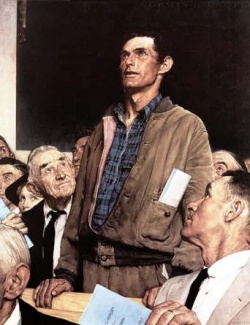Template:Free speech
Free speech

"If the freedom of speech is taken away then dumb and silent we may be led, like sheep to the slaughter." George Washington
"It is by the goodness of God that in our country we have those three unspeakably precious things: freedom of speech, freedom of conscience, and the prudence never to practice either of them." Mark Twain. Freedom of Speech includes the Freedom of Religion.
What is Free speech?
Is free speech important to the health of a free society?
The most hateful speech throughout history has been no speech at all because if "The only thing necessary for evil to triumph in the world is that good men do nothing "[1] then it is certainly equally true that "The only thing necessary for evil to triumph in the world is that good men say nothing."
If they do say it but are censored then censorship becomes an act of hatred and the censor a doer if evil.
Not only the censoring of public should be barred by the bands of society but the social bonds of society should also include an abhorrence to censorship in every conversation of man.
No speech between the people should be censored unless itself is a crime to plot or perpetrate an injury or harm others without due cause.
Nor is a bearing of false witness to do damage to people or persons acceptable.
Nor to seduce the youth or the cognitively infirm with malicious intent or a desire for unwarranted gain.
- ↑ The quote, “The only thing necessary for the triumph of evil is for good men to do nothing.” Often attributed to Edmund Burke erroneously. The philosopher John Stuart Mill, in an 1867 inaugural address at the University of St. Andrews did state: “Let not any one pacify his conscience by the delusion that he can do no harm if he takes no part, and forms no opinion. Bad men need nothing more to compass their ends, than that good men should look on and do nothing. He is not a good man who, without a protest, allows wrong to be committed in his name, and with the means which he helps to supply, because he will not trouble himself to use his mind on the subject.”